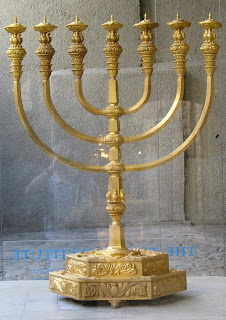 Parshat Va'Era contains a vexing verse:
Parshat Va'Era contains a vexing verse:This verse implies that HaShem's name YHVH never appears in Sefer Bereshit. HaShem only spoke to Avraham, Yitzchak and Yaakov using the E-l Sha-ddai. However, a quick perusal of Sefer Bereshit shows that this is not true. The name YHVH appears all over Sefer Bereshit and specifically where HaShem is speaking to the Avot. For example, when HaShem talks to Avraham before the destruction of S'dom and Amorah (18:13), the pasuk states: ויאמר ה' אל אברהם (And YHVH spoke to Avraham). How do we understand this pasuk from Parshat Va'Era?וארא אל אברהם אל יצחק ואל יעקב בא-ל ש-די ושמי יקוק לא נודעתי להםI revealed Myself to Abraham, Isaac and Jacob as God Almighty (E-l Sha-ddai), and did not allow them to know Me by My name YHVH.
Rashi is also bothered by this vexing verse. He states that the phrase אני יקוק (I am YHVH) in the previous pasuk means, "I am trustworthy to reward and punish." Similarly, Rashi explains that our verse refers to the fact that HaShem promised the Avot to give Eretz Yisrael to their descendants. HaShem has not yet fulfilled that promise (this is the significance of the name E-l Sha-ddai) and now HaShem is beginning the process of fulfilling the promise. Rashi's explanation works well with many Midrashim and other sections of the Torah, but alas this is not the space to elaborate.
A little use of Kabbalah yields a different explanation. If you have not read my post on the Names of HaShem - do so now. I mean it, right click and open that post in a new window. Don't worry I'll wait for you.
That post discusses the idea that the name Elokim refers to the consistent laws of nature, whereas the name YHVH refers to the miracles that are created by HaShem. Now we can add another dimension to these names - the name YHVH also refers to the covenant between HaShem and the entire Jewish people. This covenant is finalized at Har Sinai when the Jewish people accept the responsibility of performing all Torah and Mitzvot. In return HaShem promises that the Jewish people will be "chosen", they will have an eternal favored nation status. This is the significance of the name YHVH - HaShem is promising that the entire world can have a relationship with Elokim. But only the Jewish people can have a relationship with YHVH. The Avot had a special relationship with HaShem and this relationship is represented by the name E-l Sha-ddai. But the unique eternal relationship that is represented by the name YHVH has not yet been established.
When the vexing verse states that HaShem appeared to the Avot with the name E-l Sha-ddai, but not the name YHVH, a Kabbalisitic interpretation of this verse is - HaShem had a special relationship with each of the Avot, but it did not automatically extend to their descendants. Now HaShem is telling Moshe the plan to begin the process of creating the eternal special relationship with the Jewish people. This process begins with the ten plagues, continues with the exodus from Egypt and culminates in the revelation at Har Sinai. This is the significance of the name YHVH.








